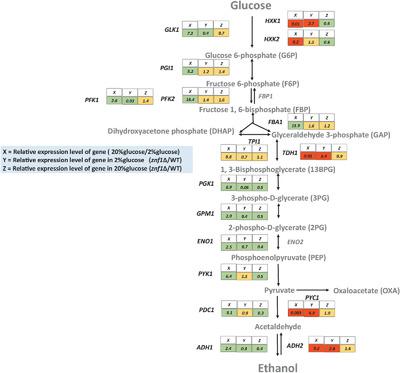当前位置:
X-MOL 学术
›
Biotechnol. J.
›
论文详情
Our official English website, www.x-mol.net, welcomes your
feedback! (Note: you will need to create a separate account there.)
Overexpression of Transcription Factor ZNF1 of Glycolysis Improves Bioethanol Productivity under High Glucose Concentration and Enhances Acetic Acid Tolerance of Saccharomyces cerevisiae.
Biotechnology Journal ( IF 3.2 ) Pub Date : 2020-03-20 , DOI: 10.1002/biot.201900492 Pattanan Songdech 1 , Justyna Ruchala 2 , Marta V Semkiv 3 , Laran T Jensen 4 , Andriy Sibirny 2, 3 , Khanok Ratanakhanokchai 1 , Nitnipa Soontorngun 1
Biotechnology Journal ( IF 3.2 ) Pub Date : 2020-03-20 , DOI: 10.1002/biot.201900492 Pattanan Songdech 1 , Justyna Ruchala 2 , Marta V Semkiv 3 , Laran T Jensen 4 , Andriy Sibirny 2, 3 , Khanok Ratanakhanokchai 1 , Nitnipa Soontorngun 1
Affiliation

|
Saccharomyces cerevisiae offers an attractive platform for synthesis of biofuels and biochemical; however, robust strains that can withstand high substrate concentration and fermentation conditions are required. To improve the yield and productivity of bioethanol, modification of glucose metabolism and cellular stress adaptation is investigated. Specifically, the role of Znf1 transcription factor in metabolic regulation of glucose is characterized. Here, Znf1 is first shown to activate key genes in glycolysis, pyruvate metabolism, and alcoholic fermentation when glucose is provided as the sole carbon source. Under conditions of high glucose (20 g L−1), overexpression of ZNF1 accelerated glucose consumption with only 0.67–0.80% of glucose remaining after 24 or 36 h of fermentation. Importantly, ZNF1 overexpression increases ethanol concentrations by 14–24% and achieves a maximum ethanol concentration of 76.12–88.60 g L−1. Ethanol productivity is increased 3.17–3.69 in strains overexpressing ZNF1 compared to 2.42–3.35 and 2.94–3.50 for the znf1 Δ and wild‐type strains, respectively. Moreover, strains overexpressing ZNF1 also display enhanced tolerance to osmotic and weak‐acid stresses, important trait in alcoholic fermentation. Overexpresssion of key transcriptional activators of genes in glycolysis and stress responses appears to be an effective strategy to improve bioethanol productivity and enhance strain robustness.
中文翻译:

糖酵解的转录因子ZNF1的过表达提高了高葡萄糖浓度下生物乙醇的生产率,并增强了酿酒酵母的耐乙酸性。
酿酒酵母为生物燃料和生物化学合成提供了一个有吸引力的平台。但是,需要能够承受高底物浓度和发酵条件的坚固菌株。为了提高生物乙醇的产率和生产率,研究了葡萄糖代谢的修饰和细胞应激适应。具体地,表征了Znf1转录因子在葡萄糖的代谢调节中的作用。在这里,首先显示了Znf1在葡萄糖作为唯一碳源时可以激活糖酵解,丙酮酸代谢和酒精发酵中的关键基因。在高葡萄糖(20 g L -1)的条件下,ZNF1的过度表达发酵24或36 h后,仅剩余0.67–0.80%的葡萄糖就加速了葡萄糖的消耗。重要的是,ZNF1过表达使乙醇浓度增加14–24%,并达到76.12–88.60 g L -1的最大乙醇浓度。乙醇生产率是在过表达菌株增加3.17-3.69 ZNF1相比2.42-3.35和2.94-3.50的znf1 Δ和野生型株。此外,过表达ZNF1的菌株还显示出增强的对渗透和弱酸胁迫的耐受性,这是酒精发酵的重要特征。糖酵解和应激反应中基因的关键转录激活因子的过表达似乎是提高生物乙醇生产率和增强菌株稳健性的有效策略。
更新日期:2020-03-20
中文翻译:

糖酵解的转录因子ZNF1的过表达提高了高葡萄糖浓度下生物乙醇的生产率,并增强了酿酒酵母的耐乙酸性。
酿酒酵母为生物燃料和生物化学合成提供了一个有吸引力的平台。但是,需要能够承受高底物浓度和发酵条件的坚固菌株。为了提高生物乙醇的产率和生产率,研究了葡萄糖代谢的修饰和细胞应激适应。具体地,表征了Znf1转录因子在葡萄糖的代谢调节中的作用。在这里,首先显示了Znf1在葡萄糖作为唯一碳源时可以激活糖酵解,丙酮酸代谢和酒精发酵中的关键基因。在高葡萄糖(20 g L -1)的条件下,ZNF1的过度表达发酵24或36 h后,仅剩余0.67–0.80%的葡萄糖就加速了葡萄糖的消耗。重要的是,ZNF1过表达使乙醇浓度增加14–24%,并达到76.12–88.60 g L -1的最大乙醇浓度。乙醇生产率是在过表达菌株增加3.17-3.69 ZNF1相比2.42-3.35和2.94-3.50的znf1 Δ和野生型株。此外,过表达ZNF1的菌株还显示出增强的对渗透和弱酸胁迫的耐受性,这是酒精发酵的重要特征。糖酵解和应激反应中基因的关键转录激活因子的过表达似乎是提高生物乙醇生产率和增强菌株稳健性的有效策略。











































 京公网安备 11010802027423号
京公网安备 11010802027423号